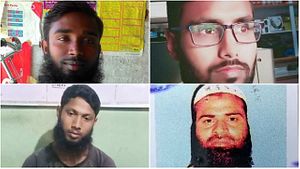The bust of a module affiliated to the outlawed Jamaatul Mujahideen Bangladesh (JMB) in India’s northeastern state of Assam last month has once again brought into focus the activities of Islamist terror groups in the sensitive border regions of the country, which had earlier witnessed the birth of similar organizations in the past.
In a series of operations lasting for a week, police arrested seven functionaries of JMB at Barpeta in western Assam following receipt of intelligence about their presence in the region. On August 9, the police and paramilitary also staged a flag march at Howly to prevent “untoward incidents” ahead of the country’s Independence Day on August 15.
Barpeta police chief Robin Kumar said, “All of them were associated with the module responsible for the blast at Burdwan in Bengal in 2014. They had gone underground for a long time moving from place to place till they landed in the district some time ago. They were functioning as sleeper cells.”
JMB is a proscribed terror group in India and Bangladesh and is committed to establishing an Islamic state in Bangladesh. On August 17, 2005, it triggered 459 bomb blasts within 30 minutes spanning almost all districts in Bangladesh. More recently, it was involved in the terror attack at a cafe in Dhaka in 2016, in which 22 people, including 17 foreigners, were killed.
In India, the group was responsible for the blast at Bodh Gaya last year besides the incident at Burdwan five years ago. A notification issued by the Indian home ministry said the group was engaged in “radicalization and recruitment of youths” for terrorist activities in the country with a focus on the border region.
Investigation has revealed that trainers from Bangladesh had conducted training sessions at select spots in eastern India five years ago. In Assam, around 60 people have been arrested so far since the module was unearthed in 2014, officials said, adding that efforts are on to ascertain if more people are involved with the JMB.
Terror Links Between Bangladesh and India’s Northeast
Ethnic insurgent outfits from India’s Northeast like the Naga National Council, Mizo National Front, and United National Liberation Front had established camps and hideouts in East Pakistan (now Bangladesh) years ahead of the War of Liberation (1971). These facilities came to an end after the war but were revived in a small scale in the 1980s. They received a tremendous boost after the pro-Pakistan Bangladesh Nationalist Party (BNP) swept to power in 1991.
Taking the lead in the early 1990s was the Assam-based United Liberation Front of Asom (ULFA) which established close ties with Pakistan’s Inter Services Intelligence (ISI). Small batches of rebels began to be trained in the Afghanistan-Pakistan region and the trail blazed by the ULFA was soon traversed by other separatist groups from the region as well.
In the 1990s, India’s Northeast witnessed the proliferation of insurgent outfits which included a few with radical Islamist agendas like the Muslim United Liberation Tigers of Assam and People’s United Liberation Front (of Manipur). On April 6, 2000, the Asom Gana Parishad (AGP) government in Assam tabled a report in the assembly titled “ISI Activities In Assam,” which described the growth of Islamist militancy in the state as the outcome of the Pakistan agency’s efforts to “destablize” the region.
But these Islamist outfits were hamstrung by many factors, including a dearth of committed members, leaders, and funds that prevented expansion of the movement. Between 1999 and 2004, as many as 363 militants from these groups were apprehended and another 120 surrendered in Assam and Manipur. Some books that give a long list of Islamist terror organizations in the region are based on fake intelligence reports compiled with vested interests and not borne out by evidence on the ground.
However, a few functionaries of ULFA who have spent years in Bangladesh claim that some cadres from these Islamist outfits who might have availed training in Af-Pak have not only settled in Bangladesh, but have also joined hands with local terror groups.
Future Trajectory Of JMB
Officials in Indian security agencies explained that JMB’s efforts to expand in Assam have not been successful but the possibility of sleeper cells emerging in the future could not be ruled out. They are of the opinion that developments in Bangladesh could have a cascading effect on India’s Northeast and they referred to reports in the neighboring country which mention the possibility of some JMB members switching allegiance to the Islamic State (IS).
Pallab Bhattacharya, former additional director general of Assam Police, said “There are reasons why sleeper cells cannot be ruled out in Assam. Firstly, JMB has links with Pakistan’s ISI and this agency has always been exploring options to foment trouble in India’s Northeast. Then, there could be more people who might be drawn to radical ideas after the completion of the National Register of Citizens (NRC) in Assam. And thirdly, although it’s quite early, the changes made in Jammu and Kashmir might also have an impact in this region of the country.”
Officials admitted that the post-NRC situation in Assam would be “challenging” for the government since a large number of illegal migrants is expected to be identified from among both the Hindus and Muslims. Three years ago, the police had begun a program of surveying the remote riverine islands along the Brahmaputra river following an order from chief minister Sarbananda Sonowal. There are over 2,000 such islands in the state where the government has minimal or no presence at all.
Rajeev Bhattacharyya is a senior journalist in Assam, India.

































